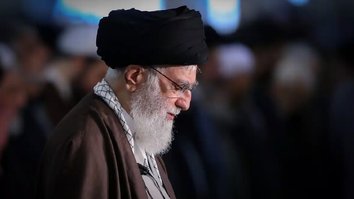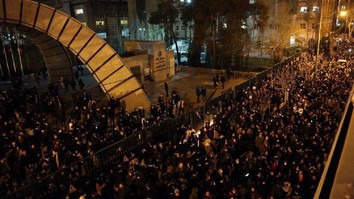KABUL -- With no end in sight to the protests in Iran and growing international concern over the potential for violence to spread, Afghan lawmakers and civil society activists are speaking out.
Instead of cracking down on protesters and making arrests, the Iranian government should listen to public demands, they say.
The demonstrations began December 28 over economic issues and then quickly escalated against the regime as a whole, leaving 21 dead and hundreds arrested, AFP reported.
Police say they have released many of the hundreds arrested during the unrest but that the main instigators are "in the hands of the judiciary".
![Protesters in Paris hold placards reading "Support Iranians who rose up against the religious dictatorship" and a crossed-out portrait of Iranian President Hassan Rouhani demonstration in support of the Iranian people January 5. The wave of demonstrations in Iran that kicked off last December 28 and quickly spread is the biggest in the tightly controlled country since unrest over a disputed election in 2009. [Christophe Simon/AFP]](/cnmi_st/images/2018/01/08/10994-Paris_protest-585_329.jpg)
Protesters in Paris hold placards reading "Support Iranians who rose up against the religious dictatorship" and a crossed-out portrait of Iranian President Hassan Rouhani demonstration in support of the Iranian people January 5. The wave of demonstrations in Iran that kicked off last December 28 and quickly spread is the biggest in the tightly controlled country since unrest over a disputed election in 2009. [Christophe Simon/AFP]
![Iranian students encounter police at the University of Tehran during a demonstration driven by anger over economic problems last December 30. [STR/AFP]](/cnmi_st/images/2018/01/08/10995-Iran_Protests-585_329.jpg)
Iranian students encounter police at the University of Tehran during a demonstration driven by anger over economic problems last December 30. [STR/AFP]
Iranian lawmakers held a closed-door session Sunday (January 7) to discuss the deadly protests.
"The parliament meeting principally looked into the condition of the people, the economic situation and unemployment," Iranian lawmaker Mohammad Reza Kachouie told his country's parliament website ICANA. "The enemy is trying to infiltrate the country by using these issues."
Demonstration a pillar of democracy
Rather than blaming outside forces, the Iranian regime should listen to the concerns of the public, Afghan civil society activists and lawmakers say.
The Iranian regime has made life very difficult for its citizens and they had no choice but to rise up, said Mohsen Abdullahi, a Kabul-based civil society activist.
"During the rule of the Taliban, [Afghans'] rights were also denied," he told Salaam Times. "Today, citizens of our neighbour, who are now in [a similar] situation and are trying to get rid of this regime, are demonstrating."
Demonstration is a civil right for citizens of every country where they choose their own political system, said Abdul Rahim Raheen, a representative from Badghis Province in the Wolesi Jirga (lower chamber of the Afghan parliament).
"The Iranian people are frustrated with the state of the economy, governance and corruption," he told Salaam Times. "They should express their problems, and the government should hear them out."
"Responding to public demands with force is oppression," he said.
"The Iranian government should listen to public demands and answer them in an Islamic way, if of course it truly is an Islamic regime," Rahim said.
Protesting is a pillar of democracy, said Wazhma Safi, a representative from Kunar Province in the Wolesi Jirga.
"It has also been asserted in international law that no one has the right to open fire when responding to civil demonstrations and movements," she told Salaam Times.
"These movements influence the process of governance ... because the public demonstrates for its goals ... so that it can achieve them," she said.
"History has shown that popular cohesion behind demands can even lead to the overthrow of governments," Safi said.
In addition to high prices and administrative corruption, Iranians have suffered from frustrating restrictions imposed on them by the regime, Mohammad Akbar Mirzayi, a Kabul-based Afghan political analyst, told Salaam Times.
"We are now living in the 21st century," he said. "The age of dictatorial and authoritarian regimes has long gone, and governments must meet popular demands, or they will be eradicated."

![An Iranian woman raises her fist amid tear gas at the University of Tehran during a protest driven by anger over economic problems last December 30. [STR/AFP]](/cnmi_st/images/2018/01/08/11002-000_vh928-585_329.jpg)






